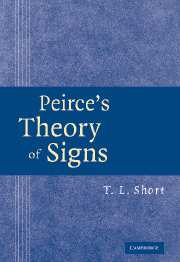Book contents
- Frontmatter
- Contents
- Preface
- Acknowledgments
- 1 Antecedents and Alternatives
- 2 The Development of Peirce's Semeiotic
- 3 Phaneroscopy
- 4 A Preface to Final Causation
- 5 Final Causation
- 6 Significance
- 7 Objects and Interpretants
- 8 A Taxonomy of Signs
- 9 More Taxa
- 10 How Symbols Grow
- 11 Semeiosis and the Mental
- 12 The Structure of Objectivity
- Bibliography
- Name Index
- Subject Index
4 - A Preface to Final Causation
Published online by Cambridge University Press: 28 July 2009
- Frontmatter
- Contents
- Preface
- Acknowledgments
- 1 Antecedents and Alternatives
- 2 The Development of Peirce's Semeiotic
- 3 Phaneroscopy
- 4 A Preface to Final Causation
- 5 Final Causation
- 6 Significance
- 7 Objects and Interpretants
- 8 A Taxonomy of Signs
- 9 More Taxa
- 10 How Symbols Grow
- 11 Semeiosis and the Mental
- 12 The Structure of Objectivity
- Bibliography
- Name Index
- Subject Index
Summary
‘Why is Jones running?’ ‘To get to work on time.’ We speak of human actions as being done for the sake of an end or in order to bring it about. It is the end sought that explains the act. Aristotle extended the same way of thinking to natural processes, but without supposing that they are directed by anything like a human intelligence. In his view, an acorn's structure and stages of growth are for the sake of its becoming an oak: the end, without its having been consciously entertained by anyone, accounts for the means by which it tends to be achieved. We shall name such ends ‘final causes’. By ‘teleology’ we shall mean such a doctrine as Aristotle's, that there are final causes in nature.
So understood, teleology is supposed to have been overthrown in the Scientific Revolution of the seventeenth century, which replaced it by mechanistic explanation. Organic life, which seems organized for the sake of its perpetuation, was an apparent exception, but Darwin's theory of natural selection is said to have expelled teleology from that last redoubt. Peirce nevertheless revived the doctrine, although in terms of a metaphysics different from Aristotle's. According to Peirce, final causation is not opposed to modern science but is implicit in some of its theories, Darwin's especially.
A similar view has been developed more recently by some biologists and philosophers, but only at a methodological level, eschewing metaphysical commitment to the reality of final causes.
- Type
- Chapter
- Information
- Peirce's Theory of Signs , pp. 91 - 116Publisher: Cambridge University PressPrint publication year: 2007



